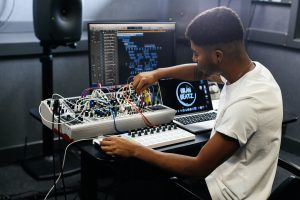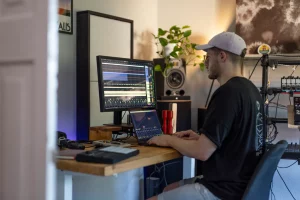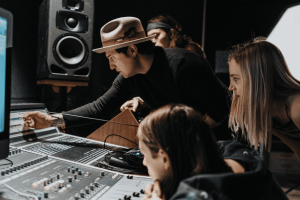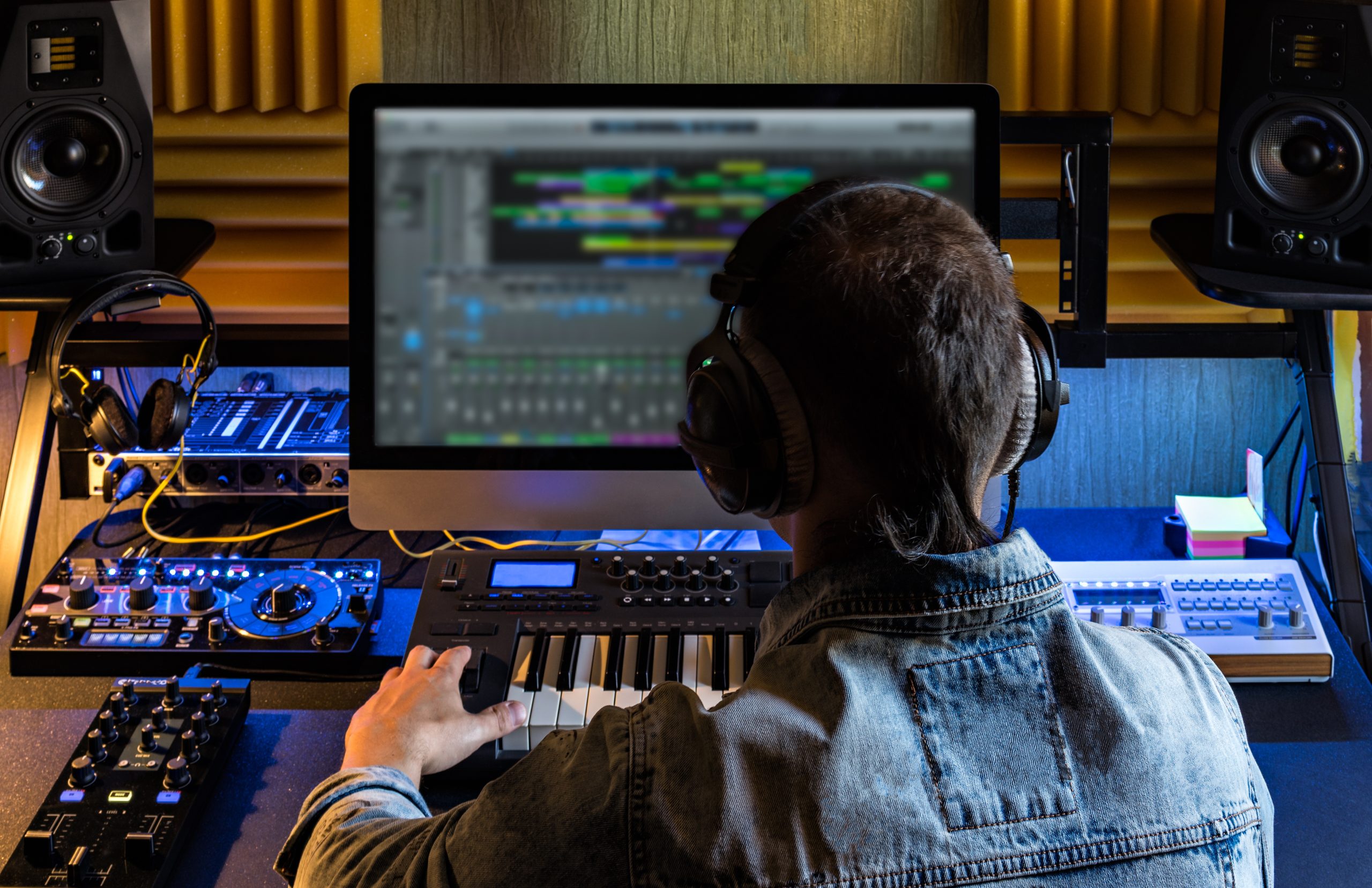Introduction
Technology has revolutionized modern music production, transforming how artists create, record, and share music. In this article, we explore the impact of technological advancements, their advantages and challenges, and provide an analysis of traditional versus modern methods in music production.
The Evolution of Music Production

Music production has come a long way from analog tape recorders and bulky equipment to today’s compact and highly efficient digital setups. Technological innovations like Digital Audio Workstations (DAWs), synthesizers, and drum machines have empowered musicians to experiment with limitless possibilities. What once required a full studio setup can now be achieved with a laptop and software.
How Technology Simplifies Music Editing
One of the biggest advantages of technology in music production is how it simplifies editing. In the past, producers had to cut and splice tape manually, which took a lot of time and effort. Now, with software tools, editing is as simple as clicking and dragging. Producers can fix mistakes, adjust timing, or change the pitch of a note in seconds. This not only saves time but also allows artists to focus on being creative without worrying about technical difficulties.
Benefits of Technology in Music Production

One of the biggest benefits of technology in music production is that it’s more affordable. Artists no longer need to spend money on renting studio space or buying expensive instruments. Technology also speeds up the process of making music. Digital tools allow producers to work faster, experiment with different sounds, and fix mistakes easily. Additionally, technology has made it easier for musicians to collaborate with others, no matter where they are in the world.
The Role of Technology in Music Production
Technology plays a huge role in shaping how music is produced. Digital Audio Workstations (DAWs) are the heart of modern production, allowing artists to record, edit, and mix music all in one place. Virtual instruments and software plugins help create a wide range of sounds, from drums to orchestras, without needing physical instruments. Artificial intelligence (AI) is also beginning to help with tasks like mastering music and generating new ideas, making the production process even more efficient and creative.
Key Technologies in Modern Music Production

1. Digital Audio Workstations (DAWs)
DAWs like Ableton Live, Logic Pro, and FL Studio have become essential tools. They allow for multitrack recording, editing, and mixing, making the production process faster and more precise.
2. Virtual Instruments and Plugins
Virtual instruments replicate real-world instruments digitally, enabling producers to add layers of sound without physical instruments. Plugins provide effects such as reverb, delay, and compression, elevating the overall quality.
3. AI and Machine Learning
AI-powered tools assist in mastering tracks, generating beats, and even creating melodies, saving time and offering creative suggestions.
Advantages of Technology in Music Production
- Cost-Effectiveness: High-quality production is now accessible to independent artists, eliminating the need for expensive studio rentals.
- Ease of Collaboration: Online platforms allow artists from different locations to collaborate seamlessly.
- Creative Freedom: With advanced tools, producers can experiment with sounds, genres, and styles that were once unimaginable.
The Role of Social Media in Music Success

Social media has become an important part of music production and promotion. Platforms like Instagram, TikTok, and Twitter allow artists to connect with fans and share their music instantly. Many songs go viral online before they even hit the radio, thanks to creative videos or challenges. This has made it easier for independent artists to gain attention and build a fanbase without the help of a record label. Social media gives musicians a direct way to share their art with the world.
How Mobile Technology is Changing Music
Smartphones and tablets have made music production even more portable. With mobile apps, artists can record, edit, and even mix tracks on the go. This has been a game-changer for creators who want to work from anywhere. Apps like GarageBand and FL Studio Mobile offer many of the same features as professional desktop software, making music production more accessible than ever. This flexibility lets artists capture inspiration whenever it strikes.
The Role of Artificial Intelligence in Music Production

Artificial Intelligence (AI) is playing an increasingly important role in music production. AI tools can help musicians with tasks like arranging songs, mastering tracks, and even creating beats. Some AI programs can analyze a song and suggest ways to improve it, such as adjusting the volume or adding effects. This technology makes the music-making process faster and can help producers achieve a professional sound, even if they are new to the industry. AI is also beginning to help musicians come up with new ideas by generating melodies or harmonies based on input from the user.
The Benefits of Home Studios

Thanks to modern technology, many artists are setting up their own home studios. This has made music production more affordable and convenient. Instead of renting an expensive studio, artists can record music from the comfort of their homes. With the right equipment and software, musicians can create high-quality tracks without leaving their house. This has opened up opportunities for independent artists who might not have the resources to work in a professional studio. It also allows for more creative freedom, as artists can work on their music whenever they want.
The Influence of Streaming Services on Music Production

Streaming services like Spotify, Apple Music, and YouTube have changed the way music is distributed and consumed. These platforms allow artists to share their music with a global audience without needing a record label. This has led to a shift in how music is produced. Now, artists often focus on creating singles or short albums that are more likely to be streamed frequently. This change has influenced the style and structure of music, with many songs being shorter and more catchy to keep listeners engaged.
The Importance of Learning New Tools
While technology makes music production easier, it also requires musicians to learn new skills. Artists and producers need to understand how to use software, plugins, and other digital tools to create the sounds they want. Many online tutorials and courses are available to help beginners learn quickly. Taking the time to master these tools can make a big difference in the quality of the music being produced.
The Balance Between Technology and Talent

Technology has made music production faster and more convenient, but talent is still the foundation of great music. While digital tools can enhance a song, they cannot replace the creativity and skill of an artist. It’s important for musicians to use technology as a helper, not a crutch. Combining talent with the right tools leads to the best results.
The Challenge of Maintaining Quality in the Digital Age
As technology has made music production more accessible, there has been a growing concern about the quality of music. With so many people producing music at home, it can be difficult to maintain a high standard across the industry. While digital tools can help improve sound, they also make it easy for poorly produced tracks to be shared online. Artists may struggle to balance quality with speed, especially when there is pressure to release music quickly. The challenge is to use technology to enhance the music, rather than letting it compromise the overall sound.
The Rise of Independent Artists

Technology has led to a rise in independent artists who are able to produce and distribute their music without relying on traditional record labels. With platforms like Bandcamp, SoundCloud, and social media, artists can now build a fan base and share their work with the world on their terms. This has given rise to a more diverse range of music, as artists are no longer limited by industry standards. Independent musicians can experiment with different genres, sounds, and styles, leading to more unique and innovative music being produced.
Challenges of Modern Music Production Technology
Despite all its benefits, technology in music production also comes with challenges. One problem is that learning to use all the tools can be overwhelming for beginners. With so many options available, it can be hard to know where to start. Another challenge is that some artists may rely too much on technology, losing the personal touch that comes with traditional methods. Additionally, the rise of digital music production has led to a flood of content, making it harder for new artists to stand out in a crowded market.
- Steep Learning Curve: Advanced tools can be overwhelming for beginners.
- Overreliance on Technology: The ease of digital tools can sometimes overshadow raw talent and creativity.
- Quality Dilution: The democratization of production has led to an oversaturation of low-quality music in the market.
The Future of Music Production

Looking ahead, technology will continue to shape the future of music production. Innovations like artificial intelligence, virtual reality, and blockchain are expected to make music creation even more efficient and interactive. AI could assist in generating new sounds or perfecting tracks, while blockchain could offer new ways for artists to sell and share their music. As technology continues to evolve, the possibilities for music production will keep growing, opening up new opportunities for artists and producers everywhere.
Analysis Table
| Aspect | Traditional Production | Modern Production |
|---|---|---|
| Cost | High (studio rental, equipment) | Low (software, home setup) |
| Accessibility | Limited to professionals | Available to anyone with a computer |
| Creativity | Restricted by physical tools | Expanded through virtual tools |
| Collaboration | In-person, location-dependent | Remote, facilitated by online tools |
| Time Efficiency | Time-consuming | Faster processes |
Comparative Table: Traditional vs. Modern Production
| Criteria | Traditional Production | Modern Music Production |
|---|---|---|
| Sound Quality | Warm, organic analog sound | Precise, customizable digital sound |
| Equipment | Physical instruments and gear | Digital software and plugins |
| Skill Requirements | Strong technical expertise | Emphasis on learning software |
| Output Speed | Slow, meticulous processes | Quick, iterative workflows |
| Global Reach | Limited by physical distribution | Unlimited via digital platforms |
Conclusion
Technology has completely changed how music is made, shared, and enjoyed. From simplifying editing to creating new genres, it has opened up endless possibilities for artists and producers. While there are challenges, like learning new tools and standing out in a crowded market, the benefits of technology far outweigh the difficulties. As technology continues to evolve, music production will become even more creative and accessible. However, true talent and creativity will always remain at the heart of great music, supported by the amazing tools that technology provides.




